 Leading Blog | Posts by Category |
 Leading Blog | Posts by Category |
03.08.24

What Is Different About Ethical Leadership?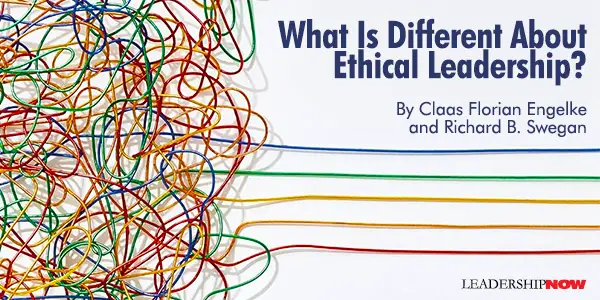
ADHERING to an ethical code during challenging times is a standout trait in many historical and present-day leaders that we’ve come to admire. Certain principals cut across the lives of such leaders as they transcend traditional leadership roles and prioritize the well-being of the communities, economies, and global society they serve. Ethical leaders embody a respect for the sanctity of each individual, regardless of culture, country, race, or religion. They have a strong orientation toward justice and fairness. While circumstances vary, their belief that everyone is entitled to the same basic dignity and rights remains a driving force for action. They have an underlying moral courage even when going against great odds. People follow them precisely because of the moral heroism they convey. Consider, for example, these leaders: Nelson Mandela – Beginning in his 20s, Mandela led a peaceful, nonviolent movement for civil rights in South Africa, for which he was imprisoned for 27 years. He was awarded a Nobel Peace Prize in 1993 for his efforts to dismantle apartheid and later became the country’s first Black president. Hamdi Ulukaya – Ulukaya immigrated to the U.S. from Turkey to escape the mistreatment of Kurds. As founder and CEO of Chobani, a top-selling yogurt company, he “operates on a simple fundamental principle, that we do well by doing good.” He has given his employees 10 percent of the company and has donated millions to fight food insecurity, while ensuring 30 percent of his workforce are immigrants and refugees. Whether leading a country, a movement, or a corporation, principled leaders act from a clear ethical foundation. They engage with issues that may not be found in a job description or easily measured by traditional metrics. At the same time, they ensure that they’re effective in delivering results. However, engaging in ethical issues is a changing realm for leaders. As witnessed by the pandemic, the world can change overnight, bringing new challenges, new dilemmas, and new choices that must be made. Keeping people safe in the broadest sense of the word becomes a foremost concern. Principled leaders must operate in a transparent and consistent manner in accordance with the values and beliefs of the organization. They need to provide sound reasons if they make choices that seemingly contradict organizational values. Clearly, ethical leadership requires a degree of introspection. An aspiring ethical leader needs to identify guiding principles and determine where to develop or reinforce existing skills — including compassion and love, trusting oneself and others, interest in others/inquisitive mindset, perseverance, and non-conforming, among other important traits. In attempting to evolve into a leader that can promote an ethics-based culture in your organization, ponder these questions: 1. What consequences may your intended decisions have for those around you? 2. In what way do the decisions you make — or the ones you avoid making — trigger consequences on a broader level (interdepartmental or across the organization)? 3. What ideas do you hold about society at a deeper level? In what way does this play into your behavior as a leader? 4. What societal, environmental, and ethical impacts does your organization have on a larger scale? 5. To what extent is your leadership team attuned to their ethical responsibilities? Is there room for improvement? 6. Assuming you can name a variety of personal values you embrace and cherish, how conscious are you of these when leading? 7. In what way do you contribute or want to contribute to the greater good? Where do you make exceptions? Why? 8. In what way do you contribute to the peaceful coexistence of individuals, teams, departments, and groups of people beyond your organization? What are you satisfied with? Where do you identify room for improvement? Overall, ethical leaders serve something greater than themselves. They have generative will — an urge and desire to create, leave a mark, improve, and serve society and establish community. What matters is the objective of a better world, a better team, a better culture, a better future.  
Posted by Michael McKinney at 09:00 AM
06.03.22

“My Band-Aid is Better Than Yours!”
TODAY, far too many leaders are arguing over Band-Aids. They see problems and react with Band-Aids. All around us, we see the result of Band-Aids. Most of the contentious issues of the day are over band-aids. “My Band-Aid is better than yours!” It feels like we’re doing something, but in reality, we’re just putting a Band-Aid on the symptom. Band-Aids are a reaction, not a preventative. Band-Aids are meant to cover a problem with the assumption that there is healing taking place underneath. But as we have seen historically, that just doesn’t happen. We cover it up and walk away, leaving the real issues to fester and grow. Band-Aids cause us to miss the deeper dscussions we need to be having. Band-Aids answer the wrong questions. For too many decades, we have been applying Band-Aids without doing anything to heal the issue. Most rules and laws are just Band-Aids. Most noticeably and pervasively, in the 1960s, we began to look the other way. And now we have nightmares. We are reaping the consequences of that decision. We have a character problem. We have a values problem. It’s character that we need to be addressing. And character issues are first dealt with in the home. And that includes the use of rules. But foundational rules that guide behavior in the right direction. Not a codebook of rule upon rule—Band-Aids to fix what’s not happening in the first place. Fundamentally, character development is a parenting issue. By coddling generations of youth, even well-intentioned coddling, we have set them and society up for failure. Coddling makes people think that the problems are “out there” instead of “in-here”—inside all of us. Safe spaces only serve to deepen divides. Seeking out and understanding differences builds an appreciation of the positive intent of others. Our most vocal leaders in government, communities, and families raise their voices for Band-Aids because they either don’t know or do not have the courage to lead the hard choices that need to be made to address character issues. Taking the time to understand and deal with the underlying issues doesn’t stand a chance under the pressure to attenuate and appease the uninformed, loud, and reactionary voices. The problem is when you are working on character issues, it looks like you are doing nothing. Ironically, you are doing everything. Dealing with the real problem is not just time-consuming but painful. It means admitting that we’re wrong, that we’ve gotten off track. Band-Aids push the responsibility for a real solution off on someone else. When in reality, the solution is with each of us. But that’s hard. Sadly, we applaud people who march for Band-Aids and never deal with the issues. We need a different kind of march. March for being better people. March for inclusiveness. March for self-control. March for real-world relationships. March for civility. March for character. There’s something disingenuous about getting in someone’s face and screaming about controlling them. Love doesn’t make you do crazy things. Love forgives. Love is patient. Unchecked emotions may trigger compromising thoughts, but character keeps those thoughts in check. We created the world we live in both individually and as a society. If we don’t like it, it’s time to change who we are—not make more rules. More rules will not stop people who are inclined to disregard them anyway. It happens in families and organizations, but it has never been so obvious as it is in government. Instead of leading, they are reacting. It shouldn’t come as a surprise, I guess. As Maslow pointed out, if the only tool you have is a hammer, you treat everything as if it were a nail. If you are a lawmaker, you try to address every problem with a law. Even then, most laws are not designed to solve a problem but to push an agenda. We’re just kicking the can down the road. We need to stop arguing over Band-Aids and come together on the underlying character issues. We divide over Band-Aids instead of uniting over character. The values that molded the Greatest Generation, for example, have been slowly brushed aside for more superficial values. Character doesn’t just happen; it is forged. We have neglected our responsibilities in the faith that posting another law will solve the problem. Times like these provide us with the opportunity to rediscover our values—values we have forgotten. For now, what can we do? Start where we can do the most good. Start with ourselves. Start at home. We must discipline ourselves before we attempt to restrict others—self-regulation. We must order our own circumstances before we go to work on others. Perhaps we all need to put away the Band-Aids and focus on the source of the issue. Then we’ll find that we don’t need another rule.
Posted by Michael McKinney at 07:13 AM
05.20.22

Values Are Guardrails
SUSTAINABLE LEADERSHIP is based on positive values that form our character. Values are like guardrails. When we are driving, we find guardrails in areas of danger or uncertainty. They are placed there to keep us on the road and not into the ditch or off the cliff. Values are like that. Values protect us from life’s pressures and temptations. In this way, we can avoid ethical and moral lapses in the heat of the moment. Negative outside influences are all around us. They can force us to react rather than respond and derail our leadership by compromising our judgment and common sense. Values are the principles and beliefs by which we live our lives and make decisions. Values are about doing the right thing—a predetermined action—when we have a choice to make. Values can be difficult because they draw a line in the sand—a guardrail. But that guardrail strengthens you and helps you to make calm, rational decisions in otherwise emotional situations. Values form your character. Your character becomes the culture of the organization—the organizational operating system. Values lived build trust. 10 Things to Remember About Values
Posted by Michael McKinney at 10:08 AM
07.16.21

Make It, Don't Fake It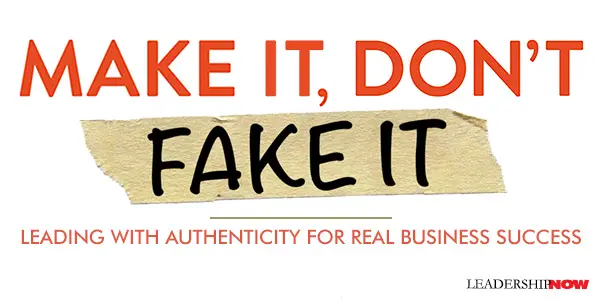
FAKE IT ‘TIL YOU MAKE IT is a common refrain in our culture. But it has been wrongfully used to justify all kinds of poor behavior and outright lies, as Sabrina Horn correctly points out in Make It, Don’t Fake It. Of all the business and career memes to gain popularity, few have compromised integrity in business, leadership, and personal success more than the expression “Fake it till you make it.” With roots in well-intentioned early twentieth-century psychotherapy, this phase has degenerated into a mantra that has encouraged and even normalized lying for the purpose of getting ahead. Now a product of modern American culture that rolls all too easily off the tongue, its mere existence tells you it’s okay to lie, from twisting the truth just a little to flagrantly deceiving others for personal gain. How true. We can’t be surprised by this in a culture that encourages selective truth, self-promotion, and short-cuts. While some use this maxim to fake a persona or misrepresent who they really are, it was never intended to be about lying. It is about becoming. It is a means to become something, not a state of being. In the same way, some people embrace vulnerability to ignore their weaknesses. The vulnerability culture that has sprung up is often used to help us justify our weaknesses rather than facing the truth and doing something to grow them to a non-toxic level. If, in our self-awareness, we realize that our authentic self is getting in our way and undermining our leadership, it’s time we did something about it rather than closing our eyes and slapping an authenticity label on it. Fake It ‘til You Make It is about acting “as if.” If you want more friends, it’s not about going around talking about all of the friends you have, but beginning to act in a way that invites friendships—like being friendly and smiling. Fake It ‘til You Make It is about taking on a mindset to produce results, not playing footloose with the facts, and lying about things that aren’t as though they were. To counteract this cultural condition, Make It, Don’t Fake It is about “ethics, passion, confidence, pride, resilience, commitment, and survival in a business context. It is about doing the right things the right way. This almost always means doing them the hard way.” Varying degrees of faking it falls along a continuum from acting “as if” to outright fraud. Horn discusses these various degrees of fakery—or call it what it is—deceit. In the heat of the moment, most of these fabrications are easy to fall into. It gets us by. But they take a toll not only on our character but also the enduring success that could be ours.
Horn then takes us through her journey as the CEO of a public relations and marketing communications agency. So, she knows what is fake and what isn’t and the consequences of each. We often think of PR and spin as one and the same, but done right says Horn, it isn’t. I like her perspective on it: There is a big difference in intent between misleading people by making something look better than it really is and simply bringing life to what is most compelling about it for the purpose of earning attention, interest, and trust. In our drive to succeed, the temptation is always there to cut corners and misrepresent ourselves. Horn begins with her first pitch to her first prospective client. I walked into PeopleSoft’s main conference room armed with a pack of business cards emblazoned with the initial name of my future company, Sabrina Horn Public Relations, and a logo the resembled a towel monogram. I had no employees, no clients, and except for the business cards, no evidence of a company, really. For anyone that has started their own company, this is an easily relatable scenario. What do you do? Misrepresenting the truth comes to mind. Faking it. Honestly, there were moments I was anxious enough to say to myself, Who am I kidding? This is nuts. They won’t take me seriously, so I had better make something up to sell them on me. But she didn’t. She disarmed her fear with preparation. When you are first starting out, doing and being anything to win the business is tempting—and also dangerous. You have to be bullish and yet stay grounded in the reality of what your company can realistically do, and then target those customers that want what you have to offer, with relatively few modifications. Horn covers what it means to start a business, the emotional ups and downs, the temptations, the risk, controlling growth, and the importance of establishing your values from the beginning. Throughout my career, whenever I was facing a crisis or felt rudderless, I attacked fear, uncertainty, and doubt and any stirrings of the imposter syndrome by referring to factual reality. I sought information to develop new strategies and options. There is a way to do it right. At the core of everything you do is integrity. And that includes creating and staying an authentic brand. The brand is the responsibility of the company’s founders and represents the why or the reason for being. Horn devotes an excellent chapter to your brand and culture and the issues involved in protecting and evolving it in a changing marketplace. She says leadership consists of two parts: winning and losing. While we like to focus on the wins, we will lose more often than we would like. No one is immune. And “it is really hard to act like a leader when you feel like a loser.” Horn shares a significant failure and the necessary after-failure postmortem. The value of a postmortem “is that it makes you face reality and keeps you from laying the blame elsewhere. The truth is, while relationships and stunts do matter, intelligence, insights, creativity, passion, and sheer effort can matter more. You lost, not because of what they did but because of what you didn’t do. There are situations where there’s just no winning. You can’t fake your age or your size or manufacture relationships you don’t have. Stay grounded, align around your core values and mission, and remind your team what you stand for. There is a reason why you and your people work at your company, and why other people don’t. Losing in these situations can be a blessing in disguise. And then there’s winning. When you are on a winning streak, know that things can and will change. Begin to plan for what is next. And a crisis will inevitably come out of nowhere. Plan for it, too, before it happens. Make It, Don’t Fake It is an excellent look at starting and leading a company from beginning to end with an integrity-at-all-costs perspective—how to make it without faking it. 
Posted by Michael McKinney at 12:30 PM
04.27.21

The FBI Way: The Seven C’s of Excellence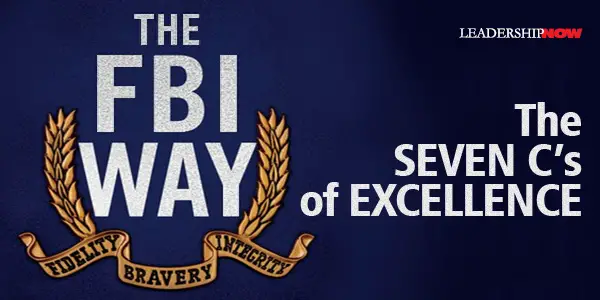
THE Federal Bureau of Investigation is a respected American institution that had its beginnings in 1908. Its 100-plus years of exceptional performance, the former head of counterintelligence Frank Figliuzzi says, is attributed to the organizational code that demanded internal excellence at all times, from everyone. He calls it the FBI Way. In The FBI Way: Inside the Bureau’s Code of Excellence, Figliuzzi organizes and explains that code and how it is maintained as The Seven C’s. These seven values are worth considering in any context. 1. Code The code reflects the core values that are shared by everyone in the organization. If you haven’t established basic behavioral benchmarks in your business, organization, team, or family, you should. They don’t have to be numerous; in fact, they shouldn’t be. Too many rules can very quickly turn into no rules at all. Determine what type of conduct so undermines whatever you or your group stands for that it poses an existential threat. Communicate those “danger zones” clearly and frequently. The FBI, as an institution, enforces code and investigates deviations from that code—the U.S. Constitution and the criminal code. Living out their own code becomes critical to that process, especially in a political environment with really no code. You can’t live by two codes at once. You also can’t spot and avoid the kinds of codes and conduct that threaten your values if you never even develop a strong sense of what it is that you value. You’ll never see the threat coming. We might not die from an absence of code, but regardless of who we are, our lives and livelihoods are enhanced when we know what we stand for. 2. Conservancy The FBI is a conservancy. I like his terminology here. Like stewardship, conservancy is “a collective effort to preserve and protect the true worth of a place or thing. People in conservancy agree to become stewards accountable for sustaining an entity greater than themselves.” Accountability is key here. And everyone in the FBI is accountable to someone, and the higher up you go, the more accountable you are. He briefly mentions the missteps of Jim Comey in 2017. Comey cast doubt on the FBI when he allowed himself to be drug into the political drama of the time. It’s human, but Figliuzzi says it basically came down to the fact that he forgot who he was accountable to. It is hard not to become political, even when writing a book such as this, but it is critical to the FBI’s credibility that it is not seen as political. As Figliuzzi advises later in the book, “Sometimes taking a broader view of your mission can help you preserve your values.” Figliuzzi notes that families need conservators too. And his wife filled that role. 3. Clarity Clarity applies in a number of ways. Clarity includes “bright lines;” Those lines, that when crossed, get you fired. Clarity of code. The need for clarity of information for decision making and the clarity to know when you have enough or all you are going to get. “You need to know when to demand clarity and when to just walk away.” And there is the clarity of purpose and principle that help you to know when to say yes and when to walk away. Too often, when organizations have their most important standards challenged, they engage in a cost-benefit analysis to decide whether to defend their core values. Those organizations don’t recognize that standards worth defining are standards worth defending. 4. Consequences There should be no surprises when it comes to consequences. A code must have repercussions when it is violated, or it is just “window dressing.” A code that’s not enforced quickly becomes a lie that undermines your entire operation. You can’t just wish a code into compliance; people need to understand that there’s a price to pay if they endanger the collective health of the larger team. Consequences put teeth in a code. 5. Compassion A code without compassion doesn’t work for long. Compassion and consequences go hand-in-hand. Sometimes compassion means looking in the mirror to see how you or a dysfunctional system lead to the poor judgment or wrong behavior. Compassion provides the necessary balance to what could be an otherwise harsh and cold process. As sure as people need to know that their leaders have set bright lines on conduct, they also need to trust that those leaders will treat them as valued human beings. That’s why good leaders take a holistic approach to weighing consequences by assessing an employee’s total record, the context that led to their lapse, and that team member’s capacity to overcome their wrongdoing. 6. Credibility Credibility is the bedrock of a values-based organization or group. And that applies both within the organization and about the organization. “People must believe in us and the values we represent. It is credibility that determines whether values survive beyond the personalities of individual leaders.” Credible preservation of principles happens when the process is codified, objective, and comprehensive. Codification means the process must not only be in writing but also easily accessible, understandable, and taken seriously. 7. Consistency Consistency is about intentionality. It helps to preserve what really matters. There was a beauty and simplicity to establishing a rhythm that went beyond mere routine. I’m talking about developing a system in your life, your work, or your studies, and sticking with it if it works, or tweaking it if it doesn’t. A consistent system. Not just winging it. But as Figliuzzi points out, that shouldn’t be confused with rigidity. Consistency may mean, at times, redefining “your entire approach in order to remain consistent with your values,” as they did after 9/11. Change shouldn’t be something that happens “to” people, it should be something that happens “with” people. It’s crucial that everyone involved understand that adapting doesn’t mean an abandonment of values or mission. To the contrary, the proposed changes must reflect how those changes are not only consistent with your values but vital to preserving them. He observes that the “FBI’s highest-profile mistakes happen primarily when its leaders act contrary to their own rules.” So build in systems that make it harder to fail. Woven into the explanation of each of these qualities are stories of 9/11, interstate chases, Quantico, anthrax, espionage, counterterrorism, homicides, and much more to illustrate his point. The FBI Way is a very profitable and interesting read. And well worth your time for the principles that are applicable anywhere. 
Posted by Michael McKinney at 11:22 PM
03.29.19

Do Ethics Really Make You a Better Leader in Business?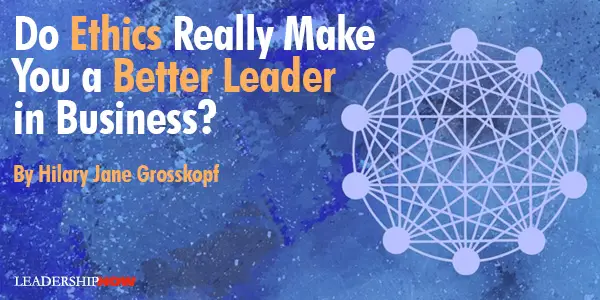
ETHICS IS NOT a word used very often behind the walls of companies and organizations. Many companies have a set of values and company policies. However, very few companies educate leaders about ethics and encourage leaders to discuss ethics with their teams. Ethics are usually an afterthought, taken seriously only after an event that causes a business or team to fall apart. If understood and put into practice by a dedicated leader, ethics have the potential to turn stagnant, declining teams into productive and engaged ones. Ethics enable new teams to continue to grow, sustain, and thrive as the individuals and the business evolve. Ethics are the foundation for peace and progress. Don’t we all crave both peace and progress at work? Ethics are timeless principles for behavior toward ourselves and others that translate to specific actions. Ethics are what fuel personal growth and make large-scale collaborative efforts work. The lack of clarity about what ethics are and what ethics really involve in action is the primary barrier for many leaders in practicing ethics at work. Here is how an understanding and intentional practice of ethics at work make leaders, and therefore businesses, stronger and more successful. Truthfulness over time opens and repairs communication lines. Ethics prize the principle of truthfulness. Though it seems straightforward, it often takes courage to truly be truthful with team members and peers. Leaders that practice truthfulness with team members build genuine trust over time. Leaders that practice truthful, transparent communication build a team culture of interpersonal respect and alignment. A practice for cultivating trust is to have regular one-on-one meetings with team members. In your one-on-one meetings, leave technology and distractions behind. Give your team members dedicated focus, ask if they have questions, and give them positive and constructive feedback. Leaders develop trust through transparent and genuine communication. Teams united in honesty and truthful communications move forward as a cohesive unit. Opportunities for individual development fuel collective progress. Leaders that understand and practice ethics at work are also better at motivating and empowering individuals in order to fuel collective progress. Another foundational ethical principle is the concept of non-stealing. In workplaces, non-stealing goes far beyond just stealing of physical possessions. Non-stealing in leadership involves not stealing (but instead giving) opportunities, knowledge, and acknowledgment to team members. Leaders can practice the ethical practice of non-stealing by giving knowledge, skills, and opportunities to team members enable progress. In one-on-one meetings, share your skills and knowledge with team members. Mentor them as they work through a special project or assignment on their own. When individuals are given opportunities to grow individually, they are more dedicated and skilled contributors. Leaders that practice non-stealing understand that individual peace and progress must happen for each team member in order for the whole to move forward. Non-attachment enables creative problem solving and the generation of new ideas. Leaders often find themselves stuck, leading a stagnant team because they are attached to their ways or outdated beliefs. Beliefs about what is right or beliefs about people’s limitations often hold back the team from progressing. Leaders who are not open to new ideas and feedback compromise the collective progress of the team. Non-attachment is practiced by letting go of your outdated beliefs about people, ways, results, or status. New ideas and suggestions that team members bring to the table are often the answers to proactively solving or avoiding problems. Don’t hold firm beliefs about the way things should be, how far someone should progress, or the exact way results should turn out. Allow space for limitless possibility and evolution to happen. Invite and evaluate new ideas and suggestions with an open mind. This practice enables collective progress. Positive communication and mindfulness foster focus and protect valuable energy. Finally, ethical leaders are masters of cultivating the conditions for collaboration. In dynamic, fast-paced business environments, leaders and teams often find themselves rushing and producing work full of errors. People burn out quickly after long days of exhausting meetings. Small disagreements or misalignments turn into political issues. Arguments deter focus and negatively impact productivity and engagement. Ethical leaders know how to practice control of energy in order to cultivate focus and ease for their team. Control of energy involves communicating with a positive tone. Even when giving constructive feedback, ethical leaders start with a positive affirmation and use a tone of equanimity throughout the conversation. This is a sustainable rather than a short-sighted approach. This control of energy helps to cultivate calm and protect the energy of the team and themselves. Control of energy also involves taking constructive rest breaks often to restore and rejuvenate. A walk outside, away from the screen and often chaotic work environment can do wonders to reset your mind and body. Lead by example and encourage your team members to do the same. Ethics are the foundation for strong leadership and collaboration. When understood and put into practice at work, ethics have the potential to fuel productivity and motivation. Ethical leaders cultivate focus, trust, and connection, which are key ingredients for successful leadership. Leaders that practice ethics in action find that the principles reach far beyond company walls and add value to their lives outside of work as well. Ethics are universal and add value to our work and life. How can you put ethics into practice to strengthen your leadership? Many leaders don’t realize that diverse teams often have very different individual perceptions of what ethics look like in practice. Teams need to learn a collective language for ethics in order for ethics to be accessible instead of vague. Leaders can lead by example by putting ethics into action by learning the ten principles from the Awake Ethics guidebook, doing the individual and team exercises for putting the principles into practice, and reflecting on how the actions of the individuals align with their core intentions of peace and progress. 
Posted by Michael McKinney at 12:44 PM
02.26.14

The 7 Lenses of Ethical Leadership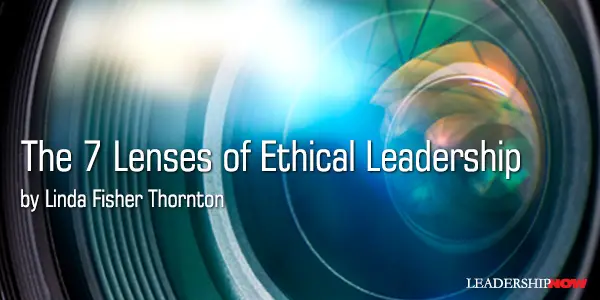
O I believe that our current understanding of "ethical leadership" does not clearly describe the complexity and ethical implications of leader behaviors, and that there is an emerging clearer, bigger picture that will. A Continuum of Perspectives One of the reasons that it's so difficult to learn how to lead ethically is because we are not all using the same definition of our ultimate destination. To one leader, leading ethically means carefully protecting the environment. To another, it simply means responsible profitability. To a third, it means fair labor and responsible people management practices. To a fourth, it means serving the long-term greater good. I believe that the bigger picture of ethical leadership incorporates all of these many perspectives that seem to be at odds with each other. In our global society "ethical leadership" is actually a continuum of different perspectives. Understanding "ethical leadership" as a continuum of perspectives helps us understand our choices in a broader context. The way we define "leading ethically" needs to be broad enough, complex enough and multi-dimensional enough to help us talk about today's difficult choices intelligently.Talking about these differing perspectives as part of the whole, and not competing perspectives moves the conversation forward. A Multidimensional Framework In 7 Lenses, I describe a clear multidimensional framework for ethical leadership that incorporates seven different perspectives on what it means to lead ethically in a global society. This framework honors organizational complexity and guides leaders through the challenge of honoring multiple stakeholders when making decisions.
Only by considering all seven of these lenses do we get the full picture of our ethical leadership responsibility in a connected global society. Starting with the Profit Lens, each lens we add to our perspective gives us a new sense of clarity about what ethical responsibility means.Why is this ongoing learning journey so important for successful leadership? Besides responding to our moral responsibilities, proactive ethical leadership drives important business metrics and provides a competitive advantage. Forward-thinking leaders will use 7 Lenses as a learning guide on their journey to ethical leadership, and along the way, they will enjoy the many business benefits that result from bringing out the very best in their people and organizations.  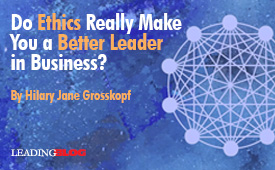 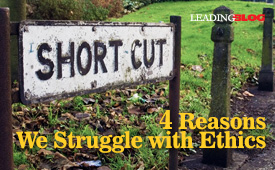
Posted by Michael McKinney at 08:24 PM
06.13.13

The Ten Virtues of Outstanding Leaders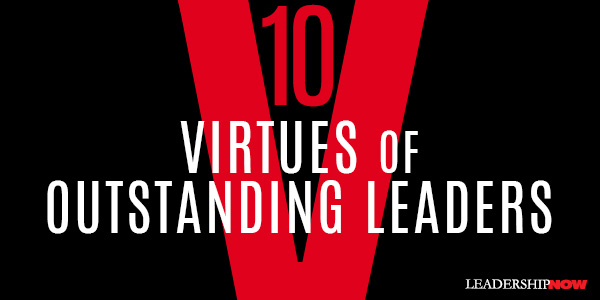
LEADERSHIP and character are inseparable. In the Ten Virtues of Outstanding Leaders, philosophers Al Gini and Ronald Green, ask what is good leadership? They insist "that ethics, character, and virtue are essential to real leadership" and anything else is misleadership. They define leadership as: Leadership is not just a set of learned skills, a series of outcomes, a career, a profession, or a title. Leadership, at its core, is about character: specifically, a character attuned to its ethical responsibilities to others. The kind of character that, in regard to others, always tries to do the right thing, for the right reason, on purpose. They suggest ten virtues or traits of character and as such they describe not just a leader's behavior but a clear sense of the way a leader thinks; the beliefs and motivations behind their actions. They note that these virtues are fragmentary in that they can exist apart from one another and rarely does any leader possess all of them. 1. Deep Honesty. Not just truth-telling but a bias for the truth. "It describes the leader's basic commitment to the truth, and a sense of shame or anger when deceitfulness replaces truth-telling." (James Burke, Johnson & Johnson) 2. Moral Courage. "Here one confronts a multitude of things that terrify people: fear of criticism or embarrassment; fear of poverty or job loss; fear of losing friends or being ostracized—even fear of being seen to be in the wrong. Overcoming self-doubt can be an expression of courage." Courageous leaders hold fast to their values and purpose even when there is no certainty that they will prevail. Courage is of particular importance because unlike the virtue of honesty, is not an aim in itself but it supports other moral claims. As such, philosopher Robert Merrihew Adams describes courage as a "structural virtue." (Abraham Lincoln and Rosa Parks) 3. Moral Vision. Great leaders not only "exhibit moral courage, they are also able to understand the meaning of the values they fight for and the importance of ethics in both human life and in the life of organizations and communities." They understand the consequences of ethical values and are able to share it with others. (Winston Churchill) 4. Compassion and Care. The ability to connect with and resonate to the needs of their followers. Leadership is a relationship. (Oprah Winfrey) 5. Fairness. Leaders should be fair in executing policies across the board. Fairness reinforces followers' trust. Everyone is special but not different. (Dwight D. Eisenhower) 7. Creative Thinking. A tendency toward independence and creativity in thinking. It may show itself "in new ways of accomplishing organizational goals, and even of redefining those goals." In periods of great change a "premium is placed on leaders who can come up with original solutions or approaches." (Herb Kelleher) 8. Aesthetic Sensitivity. This virtue is not just an appreciation of the creation of beauty, but an ability to leverage it for the organizations advantage. "By paying attention to the aesthetic dimensions of their enterprise, outstanding leaders pioneer new products and services and actively shape the tastes of millions." (Steve Jobs) 9. Good Timing. This, like courage, is another structural virtue. It is necessary for the pursuit of any worthy goal. "Like deep honesty, good timing defies superficial outer appraisal. A leader who waits the precise moment to act may appear indecisive to those who urge a quicker response. Such a leader must also have the courage to weather criticisms." (Charles de Gaulle) 10. Deep Selflessness. The willingness to sacrifice oneself. In moments of great organizational uncertainty or crisis, a leader's self-sacrifice "could send a clear message as to what kind of conduct is needed to overcome the crisis and how earnestly the leader is committed to the cause of the organization. It conveys to followers the leader's strong conviction that 'we can do it,' and is an earnest invitation to participate." (Martin Luther King Jr.) In the second part of the book they explore the meaning of each of these virtues through the lives of leaders that lived and exemplified them. "Virtue is learned," write Gini and Green, "by witnessing the deeds of others." 
Posted by Michael McKinney at 11:33 PM
04.03.13

4 Reasons We Struggle with Ethics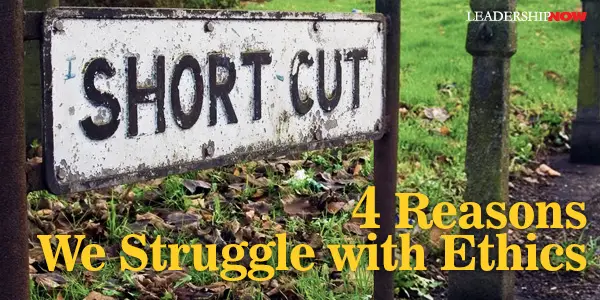
ETHICS IS ABOUT who we are. Ethics is not so much about what is happening around us, it’s much more about what is going on inside of us. Understanding the difference is critical to being a person with good ethics. Ethics are not concerned about what we can do, but what we should do. Ethics align us to our purpose and our values no matter what is happening around us. Ethics are about how we will measure our life. Our choices are taking us somewhere. The question is, “Where do we want to end up and what kind of person do we want to be when we get there?” Our ethics can be compromised for the following reasons: We want to win. The pressure to deliver results now causes us to make decisions to get us what we want now but ones that will eventually take us to the wrong place. Compromises are everywhere. We are one decision away from compromise. Ethics come in to play when the right decision for the long term doesn’t make sense for the short-term. Actions based on long-term values may not give us the same sense of achievement as short-term based actions, but they take us to two different places. If the right decision means losing in the short-term, the question then becomes, “How important is winning?” We think our situation is different. We’re the exception. But if what is right is dependent on our situation, then nothing is right. To be right, right must be applicable to all people across all situations. Sometimes we think we can avoid the consequences if our intentions are good. But the reality is we can’t avoid the consequences. Every choice has a consequence. We look for shortcuts. Shortcuts are duplicitous. They involve compromise and they cost us far more than they save us. Shortcuts are often doing the right thing at the wrong time. It’s the easy route. A shortcut is simply finding the path of least resistance. Shortcuts are simply a way to avoid the price of admission. Good things take time. We just get tired of waiting. When we look back on the decisions we have made in our life where in an effort to hurry things along, we can see where we compromised our character—our ethics. Looking back we can see that we paid a higher price than if we had stayed the course. If getting there quicker—the what—is more important than how we get there, then we will compromise our ethics. We think ethics is about rules. Laws can be demanded of people but ethics can’t. Rules are reactive. Ethics is proactive. Rules are about maintaining. Ethics is about leadership. Rules can only go so far. You can’t lead on rules alone. Rules can only regulate certain behaviors, but to grow you need to lead with ethics. Leading with ethics means to lead within a framework defined by how not what. Ethics provide a framework in which to make right choices—a framework in which to lead. They provide the how for our what. Of Related Interest:
Posted by Michael McKinney at 11:06 PM
02.26.13

5 Key Practices to Earn Trust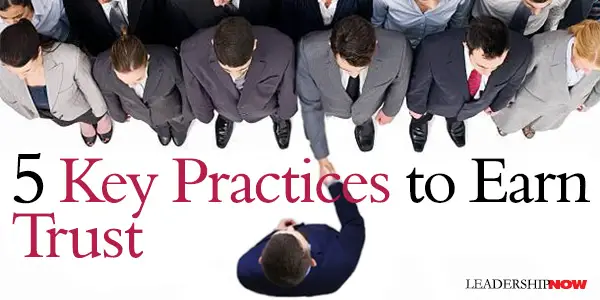
TO TRUST or not to trust is a decision we all make every day. As leaders, we can influence people’s decision to trust not only us, but others in the organization and even the organization itself. Robert Hurley has identified ten specific trust factors in The Decision to Trust. The first three factors are trustor-related: the level of risk tolerance, the trustor’s level of psychological adjustment, and the power position of the trustor.
With these ten factors in mind, you can more easily diagnose why trust may be (or likely to be) high or low in your organization. You can also see what you are contributing to the situation—positively or negatively. Here are five key practices to earn trust: 1. Align your interests with those whose trust you want. High trust leaders try to move their enterprise together by encapsulating stakeholders’ interests not pitting stakeholders against one another. If you want to build trust, start by clarifying and aligning stakeholder interests and prove that you will promote those interests in a fair manner. This may seem to go without saying, but “one of the reasons that trust has broken down in business and society in general is that there are many situations where the complexity of misaligned interests is not acknowledged, must less dealt with.” In these situations, “the best you can do is be clear about interests, decide whose interests will be primary or secondary, and be transparent about what trade-offs you are making and why.” 2. Demonstrate Benevolent Concern. We tend to trust people who we believe will care about our welfare—they demonstrate a benevolent character. People, who appear concerned only with themselves, engender distrust. If you want to earn trust, demonstrate to others that you will do the right thing for them even if it puts you at risk. “Demonstrate a respect for others and understand others’ needs in a way that helps them find win-win solutions.” 3. Develop and demonstrate Capability in the Matter at Hand. We are only trustworthy if we can deliver on our commitments. Good intentions, benevolence, and even ethical conduct, do not warrant trust if the other person is incompetent. High trust leaders make sure that there is a reasonable probability and capability to deliver before they make promises. 4. Create a track record of Predictability and Integrity. High trust leaders tend to practice values based leadership, which creates consistency and coherence in their behavior. Trust comes from always striving to honor ones word. 5. Communicate, communicate, communicate and do it clearly and openly. Because is largely about relationships, communication is critical. Communication is also the vehicle through which the other four elements of trustworthiness are delivered. Aligning interests, demonstrating benevolence, accurately communicating ones capability and practicing what you preach all require effective communication skills. Spirals of distrust often begin with miscommunication, leading to perceived betrayal causing further impoverishment of communication and ending in a state of chronic distrust. Open and transparent communication can induce others to open up and reciprocate with feelings of confident reliance. Of Related Interest:

Posted by Michael McKinney at 10:10 AM
01.28.13

It’s Never About the Bike: A Lesson from Lance Armstrong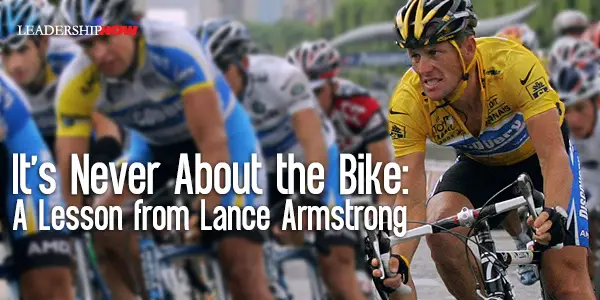
LANCE ARMSTRONG once wrote: “I believed I had a responsibility to be a good person, and that meant fair, honest, hardworking and honorable. If I did that, if I was good to my family, true to my friends, if I gave back to my community or to some cause, if I wasn't a liar, a cheat, or a thief, then I believed that should be enough.” Often we begin the race with solid values. We begin with values that drive our behavior based on intrinsic rewards. But over time, something can happen if we are not careful. Competitive pressures weigh on us. The chance for extrinsic rewards like money and power loom larger. If we have not built the strength of character to resist those temptations, we can easily become the person we don’t recognize.  The fact is, success changes nothing. Our legacy is built on the how not the what. It’s never about the bike. Without a strong hold on intrinsic values like humility, respect, truthfulness, patience and honor, we leave the door open for corruption and fraud. Changing what we value, changes everything. More to the point, it changes the choices we make. Choices build the life we lead and the legacy we leave. When it’s all about the win, we lose. Good values and solid character build a firm foundation for wins that can’t be taken away.  
Posted by Michael McKinney at 11:09 PM
06.20.11

You Can Be Legal and Still Be Wrong
IT’S NOT UNCOMMON to find a big difference between what’s legal and what’s right. Our preoccupation with “what’s legal” ensures more legal problems. If we paid more attention to what’s right, we would take our relationships to a new level. And it’s all about relationships. Legal is about what I can get away with. Ethics is about what is right. Legal requires less thought than ethics. It's easy to shrug off responsibility when I can simply point to a law, a policy, or a rule. “I’m sorry. What can I do?” Legal is about me. Ethics is about you. Ethics requires that you take responsibility for outcomes. Ethics says, “I care what happens to you.” A legal approach simply responds with, “Read the contract. It’s all there.” Too many organizations base their actions on the answer to the question, “Is it legal?” or “Are we protected?” As a result, they often end up on the defensive and consequently and unnecessarily spend excessive amounts of money on public relations, branding, and customer service. If they changed the question to “Is this right?” or “Is this how we would want to be treated?” they would find they have to rely less on what is legal and as a result create better relations with all stakeholders. But it’s not faceless organizations that are to blame. It’s individuals in a culture that is preoccupied with “what can I get?” Organizational cultures that ask employees to make everyday decisions based on expediency, one-sided considerations, and policies and procedures designed to protect rather than facilitate, are going to miss the mark. Regardless of contracts, policies, and procedures, people want to feel like they are being treated fairly. “Is-it-legal?” thinking just isn’t going to get you there. An ethical culture is one that thinks differently. It asks, “What is the right thing to do in this situation?” Ultimately, it is an organizational and individual leadership problem. Anyone in an organization can stop and ask themselves, “Is this right? Is it fair? Is it just?” and respond accordingly. Legal departments should become ethics departments that place the emphasis on doing what is right; advise based on higher values; leaders that place more emphasis on the upside rather than on the downside of an action or decision. How-does-this-help rather than what-is-the-worst-that-can-happen-to-us if we just do what we want? Might doesn’t make right. It makes animosity, distrust, and isolation. Of course, we need some laws, rules, and procedures, but they must be applied ethically. We will always be confronted with legal challenges, but if our responsible response is focused on what is right and not on what we can get away with, we will become better companies and employees.  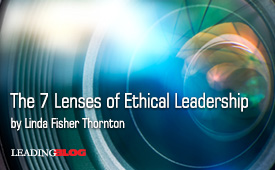
Posted by Michael McKinney at 10:13 AM
01.10.11

The Power of Framing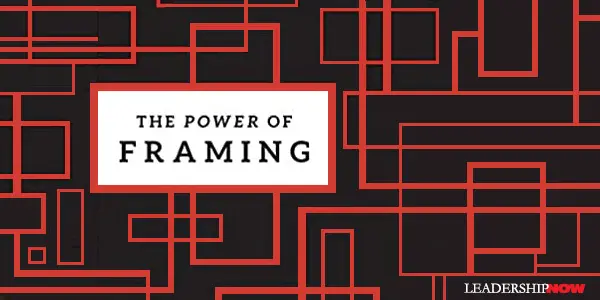
“Language becomes a key issue not just in our own sensemaking, but in how effectively we impact the sensemaking of others,” writes Gail Fairhurst. As leaders, we recognize that we cannot accomplish our objectives on our own, so this becomes important when we are trying to align the interests of others with our own. The Power of Framing by Gail Fairhurst is about understanding the meaning—the shared reality—created in our communication. Paraphrasing Michel Foucault, she writes, “people know what they say, and they usually know why they say what they say. What they do not understand is what they say does. The Power of Framing is an essential leadership book that will help us to understand the context-shaping features of our language so that we can then better manage the meaning of our communication. Recently, we have seen many examples of leaders creating unintended “realities” from the content of their communications alone that only served to make a big problem, bigger.People with the skills to communicate reality in a meaningful way often emerge as leaders, she observes. What we often fail to consider, is that when communicating, we are not just reacting to the environment; we actually shape or create it by how we interpret and talk about it. Being conscious of our framing then becomes critical. Self-awareness plays a major role in framing our communication to have the impact we intend. She begins by presenting six guiding rules for constructing reality: Rule 1: Control the Context. Leaders often cannot control events, but they can control the context under which events are seen if they recognize a framing opportunity. Rule 2: Define the Situation. At its most basic level, framing reality means defining “the situation here and now” in ways that connect with others. Rule 3: Apply Ethics. “Reality” is often contested. Framing a subject is an act of persuasion by leaders and imbued with ethical choices. Rule 4: Interpret Uncertainty. It is the uncertainty, confusion, and undecidability of “the situation here and now” that opens it up for interpretation and provides an opportunity for the more verbally skilled among us to emerge as leaders. Rule 5: Design the Response. Ultimately, leadership is a design problem. Leaders must figure out what leadership is in the context of what they do and, through framing and actions, persuade themselves and other people that they are doing it. Rule 6: Control Spontaneity. Effective framing requires that leaders be able to control their own spontaneous communications. With these rules in mind, Fairhurst explores framing as a skill that leaders must master to communicate vision and set priorities, a science that shows leaders how to think on their feet and frame on the spot, an art form that leaders must hone like a craft with story, metaphor, argument, and visual images as their primary tools, a set of emotions that leaders must deploy to complement their message and as an ethical response in order for leaders to achieve and maintain believability. As a science she explains the concept of priming for spontaneity. It’s more than just thinking through what you want to say in a given situation. It involves thinking through your mental models. She writes, “If you take the time to consciously and periodically think through your mental models as a leader, you are priming your unconscious to select and interpret new information using the models as a reference point.” What we say reflects our thinking and view of the world. Emotions are a part of leadership and emotional intelligence is required for framing. When emotions are running high you have an opportunity for framing. “Emotional regulation is a part of emotional intelligence, and two framing concepts play a role in this regard,” says Fairhurst. “Priming for spontaneity can assist in controlling one’s emotions in advance of a situation if one envisions a wide range of responses are likely to occur. Also, framing after the fact, or reframing, allows leaders to correct the emotionally charged messages they wish to modify.” In regards to ethics, she reminds us that “how we frame is a window into our ethics whenever we act in a leadership capacity.” This is closely tied to the concept of priming. We reflect and communicate our mental models in all that we do. To use in conjunction with this book, Fairhurst has created some valuable downloadable framing tools. There are links to additional resources for specific topics raised in each chapter, including films, documentaries, news clips and PowerPoint teaching slides. 
Posted by Michael McKinney at 11:52 AM
11.02.10

Political Leadership and Compromise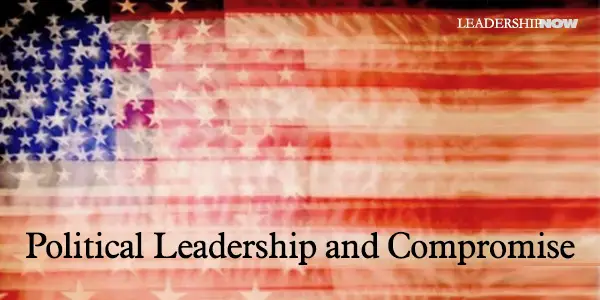
ON ELECTION DAY our minds turn to political leadership. Men and women are elected with the expectation that they will honor commitments they have made to the voters. This often leads politicians to take a short-term view of almost everything. At the same time, plagued by reality, a politician (or any leader for that matter) may find that they have to change direction or offer a compromise. This leads to the “disconnect” we frequently have with political leaders. The problem facing politicians is that reality doesn’t sell. (And of course, we play a hand in that.) So frequently, what gets them into office is not the approach that will get the job done. It is a dilemma all leaders face. It’s a dilemma that requires a certain degree of wisdom. Prudent flexibility, adaptability, and compromise are necessary qualities for leadership. Yet we often hold in high esteem leaders who don’t back down more than those that compromise their position. No one wants to be viewed as weak. But a leader that will not change or even listen to the need for change can cause irreparable damage. It’s easy to get lulled into a sense of our own permanence. We must remember that leadership is temporary. It is a sacred trust that we hold for only a short time. The skill is in understanding what one can be flexible about and what one should not. We should never compromise principles, but approaches (even the proper understanding of how those principles are applied) may need to be adapted. Values and approaches are distinct from universal laws and principles and are derived from them. The former may change; the latter never does. The fact too remains, that we may be wrong, our perceptions might be faulty and our assumptions may be without foundation. When faced with the facts, we need to be able to change direction and chart a new course without losing sight of the ultimate goals. Stefan Stern recently wrote in an excellent post on knowing when to shift your position: “If you are heading full speed ahead for the rocks it is time to change direction….Good leaders adapt to changed circumstances, and admit it when they have made a mistake.” In the introduction to Profiles in Leadership—an excellent collection of essays on leadership—biographer Walter Isaacson shares a historical perspective on compromise: The greatest challenge of leadership is to know when to be flexible and pragmatic, on the one hand, and when it is, instead, a moment to stand firm on principle and clarity of vision. Even the best leaders get this wrong sometimes. I learned this when writing a biography of Franklin. His instinct was to try to balance the conflicting values that were at issue during moments of tough debate and to find common ground. At the Constitutional Convention, he was, at eighty-one, the elder statesman. During that hot summer of 1787, the rivalry between the big and little states almost tore the convention apart over whether the legislative branch should be proportioned by population or with equal votes per state. Finally, Franklin rose to make a motion on behalf of a compromise that would have a House proportioned by population and a Senate with equal votes per state. “When the table is to be made, and the edges of the planks do not fit, the artist takes little from both, and makes a good joint,” he said. “In like manner here, both sides must part with some of their demands.” His point was crucial for understanding the art of true political leadership: Compromisers may not make great heroes, but they do make great democracies. 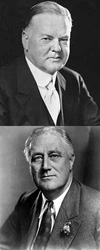 FDR on the other hand was not as well regarded and was mostly known for his connections and family background. “In the end, however,” writes Brinkley, “Herbert Hoover left the white house thoroughly discredited, repudiated, even hated, while Franklin Roosevelt was revered by much of the world when he died in office.” The difference was flexibility. Hoover was “A victim of his convictions, convictions that seemed to him close to absolute….Hoover’s unshakable principles shackled him time and again in his effort to deal with the Depression.” On the other hand, the quality that separated Roosevelt “most decisively from Hoover, was his pragmatic, experimental nature.” The contrast between Hoover and Roosevelt, Brinkley concludes, “suggests that leadership cannot succeed through ideals and strong convictions alone. The world is a complicated and ever-changing place, and a great leader must be capable of adapting to change and understanding the diversity of the ideas and principles that shape history.” Roosevelt was more successful in guiding the United States through the two greatest crises of the twentieth century, “in part because his values were appropriate to his time but also because he understood that values must reflect the realities of his age.” 
Posted by Michael McKinney at 10:21 AM
10.06.10

What Do You Do and Say When You Believe What You Think is Right?Knowing right from wrong is one thing, but acting on it is something else. What is stopping us from acting on the values we feel strongly about?Making decisions based on your values is the right way to live. It is also true that conflicting values are a normal part of individual and organizational life. Learning to voice our values in a way that they will be heard becomes an important part of great leadership. Values, as distinct from morals and ethics, are those things that are important to you. Great leaders, at any level, preserve core values. But that’s not always easy to do for any number of reasons: We feel alone We wonder if we’re being naïve We wonder if we’re misinformed (and give in to rationalizations) We wonder if our boss will be receptive We anticipate that we will encounter resistance and we don’t want to be argumentative We worry about being ostracized or worse if we appear not to be a team player Any of these reasons are enough to make you keep your head down. But not speaking up can have large and often unseen repercussions not to mention the lack of emotional commitment we feel when we are not able to live our values. Speaking up can require a bit of finesse. Not everyone sees things the way we do or even if they do, they don’t see how the value applies. Giving Voice to Values by Mary Gentile, encourages us to think through our values. Most often the kinds of values conflicts that we will encounter are predictable and are of the “right versus right” variety opposed to “right versus wrong choices”—truth versus loyalty; individual versus community; short term versus long term; justice versus mercy. Although we can feel as though our hands are tied, people can and do voice their values successfully. If we can understand our own motivations and those of others, develop the emotional intelligence to identify and practice different approaches to voicing our values in changing contexts (without becoming self-righteous), and reflect on and practice verbalizing our values, we can increase the likelihood that we will voice our values effectively. Thinking through our values creates options for us to consider when we encounter conflict. Reflect on:
It is not easy to act on our values in an environment where it is not encouraged. But the first step is to live intentionally or we get caught in the moment and face the regret of saying nothing when something should have been said. Gentile recommends that we begin by asking—“What if we wanted to voice and act on our values? What would we say and do?”—out loud with colleagues and friends. When we do, “we not only generate scripts and skills for ourselves, but we invite others to be part of our process, building a set of allies who are engaged first simply by helping us to solve our problem, with no strings or commitments attached. But once we all work together to craft a response, the barriers begin to feel assailable and our confidence builds. ” We have seen the effects of the failure to make the right choices. Getting the right kinds of conversations started in the first place is often where people and organizations go wrong. Through Giving Voice to Values, Gentile is trying to raise awareness and give practical approaches to building the skills and courage necessary to know what to do when you know something is wrong. Giving voice to values is an ongoing skill-building endeavor. It takes—above all—practice.
Posted by Michael McKinney at 04:58 PM
07.23.10

The Five Accountabilities You Need to Implement Now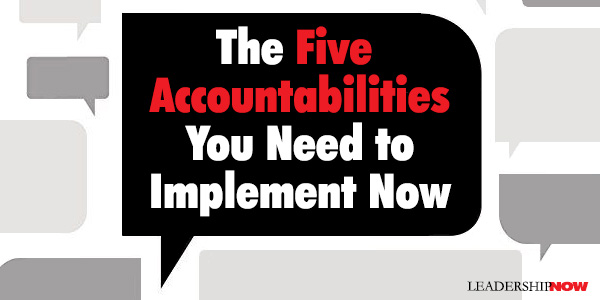 No More Excuses by Sam Silverstein is about expanding your accountability zone. To do that it means “reaching the point in your life where you can say, ‘No More Excuses! I’m not going to make excuses, and I’m not going to buy excuses.’” Excuses only legitimize the past, ignore the present, and eliminate the future.
No More Excuses by Sam Silverstein is about expanding your accountability zone. To do that it means “reaching the point in your life where you can say, ‘No More Excuses! I’m not going to make excuses, and I’m not going to buy excuses.’” Excuses only legitimize the past, ignore the present, and eliminate the future.
Silverstein’s book is built around The Five Accountabilities he has developed to help you—in a practical way—to move beyond the excuse; to make accountability a way of life for you personally and part of your organization’s culture. The five accountabilities are: Doing the Right Things. Begin by identifying your strategic intent. What are you trying to accomplish and by when? We are accountable for understanding and identifying our strategic intent—and the activities that support it. Mt. Everest climber Ronnie Muhl, told Sam: “You get into the habit of asking yourself, ‘If my life depended on the next action I took, how differently would I perform that action?’ —because doing the wrong thing can have massive consequences.” Managing Your Space. We are accountable to create the new space we need to grow and innovate in our own lives, which sometimes means taking space from something else that we’re doing. “Force of habit prevents us from giving ourselves the physical, mental, financial, or emotional space necessary to shake things up a little bit and put something new in our lives—something that could provide growth and improvement.” David Silverstein, CEO of the Breakthrough Management Group International, told Sam, “You have to be willing to cannibalize your own business in order to grow.” Managing the Process. We are accountable for creatively making progress toward whatever it is we are trying to make happen even when we hit an obstacle. It means not throwing up our hands and saying, “If it’s not meant to be, it’s not meant to be.” Kenneth Evans, Dean of Price College of Business at the University of Oklahoma told Sam, “The real problem with the way that some people look at accountability is that oftentimes it’s layered into a notion of a rigid set of expectations and performance parameters, and frankly, you can get into very deep trouble if that’s your mantra. How you react to changing events is important as well.” Establishing the Right Expectations. We are accountable for establishing the right expectations, that reflect our values, that are properly benchmarked, and are a bit of a stretch. Clothier Elim Chew, spoke to Sam about the leading from where you are at his company 77th Street, “The people who accept responsibility for, say, 10 things that are part of their job description and then accept personal accountability for five more things all on their own are the ones who are more likely to get the bigger bonuses and bigger raises in this company. They’re the ones who may end up running a business of their own someday.” Contributing to Your Relationships. The success or failure of our relationships depends entirely on the contributions we make. We are accountable for giving to our relationships—without keeping track. “In fact, the quickest way to kill a relationship is to start keeping track of all the reasons it’s not your turn to give to it and support it.” Sam adds, “We should constantly be looking for ways to invest in the relationship and enhance the value of the relationship over time.” Sam says, “Building relationships is about choices, and the choices should always be based on your values. To get a fix on your values, ask yourself: How can I best serve this relationship in the short term and the long term?” Brian Martin, CEO and founder of Brand Connections, talked to Sam about managing emotions. He said, “I have asked every single person I’ve hired two questions: ‘First, what is most important for you to feel professionally, every day? And second, what’s most important for you to avoid feeling? What would you really rather not go through, not have to replay with your spouse at the end of the day, when that person asks how your day went?’ I keep the answers on file, and I look at those answers every week when I do my own planning.” More information can be found at SamSilverstein.com to help you implement the Five Accountabilities. “If you want to build an organization that achieves its goals and beats the competition, it’s time for No More Excuses.” 
Posted by Michael McKinney at 06:56 PM
01.06.10

Business Reputation Isn’t Just About BusinessPeter Firestein makes the claim that “reputation is the strongest determinant of any corporation’s sustainability.” It determines value and relationships.The corporate landscape has changed. Corporations don’t exist in a social vacuum. In Crisis in Character, Firestein writes, “the individuals who run significant companies hold much more than the companies themselves in their hands. Their influence extends to where the children of their employees can go to college, and whether the communities that surround them survive.” People look to corporations as they look to their politicians. They want corporations to reflect their own values. As a consequence, the question arises: Why should the conduct expected of corporations and individuals differ from each other? Why should we not hold both to the same standards? A corporation’s strong social identity can cast its light across products and services, and onto the attitudes of investors, legislators, regulators, and prospective business partners.All of this adds up to a greater reputation risk. Reputation goes deeper than a corporate press release. It’s embodied in the system and the people who run it. To help companies achieve a balance between their internal realities and the demands of investors and society, Firestein developed a set of seven strategies that are of immediate use:
The CEO must foster a company whose characteristics are such that its influencers assume both its good intentions and its fundamental ethics in all circumstances. Should a crisis occur, that company receives the benefit of the doubt during the crucial time it takes to investigate the oil spill, the factory explosion, or the defective product. It will already have earned the chance to tell its story before the adverse event takes place. That’s the most important characteristic of a good reputation. The history of corporate failings is laden with tales of companies that have arrived completely unprepared at moments of crisis. When did Noah build the ark? Before the rain.
Posted by Michael McKinney at 09:06 AM
12.30.09

Is Business Just About Making Money?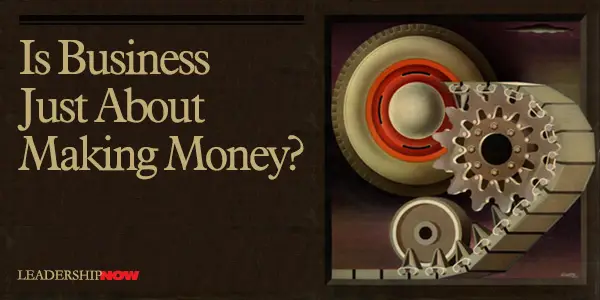
WE’VE all heard, “The business of business is making money. If you don't make money, you won't stay in business for long. If you don't have it you can't give it.” The question for business is: “Can you ever care about anything other than profits?” How to be profitable and socially responsible is not always self-evident. Daylian Cain, a professor at Yale School of Management who specializes in conflict of interest issues says that “acting on your values in the workplace can be more complex than it seems.”  Realities of the marketplace often clash with social responsibility. It costs money to do more than look after the bottom line—to do the right thing for employees, the local community and society at large. As consumers, we demand lower prices. We don’t want to pay any more than we have to. If we can buy a product for half the price of a similar product, we usually do. But what if that behavior drives the socially responsible business out of the marketplace? Just because we can squeeze out another dollar, should we? By acting in our own "best interest" are we bankrupting socially responsible efforts? Are we willing to pay the price for social responsibility?
Professor Ray Fisman of Columbia Business School remarked, "There is no shortage of inspiring examples of companies who have made money and done good for the world, but I wouldn't want to frame it as a generalized principle. There are also companies that have made enormous sums of money by not doing good. I think suggesting that good citizenship is always a win-win can be dangerously misleading." Most businesses and consumers want to do the right thing. But our commitment is really put to the test when it costs us something. Principles consistently applied over time are the ones we really care about. Cain said “A lot of students have mixed feelings about the purpose of business. [They wonder if it’s] really only to make a profit. One of my jobs is to provide a safe space for sharing those views. One of the challenges is not merely to educate about these problems but to try to change behavior.” Social responsibility, he says, “is about doing good because it’s the right thing.” Social responsibility is more complex than just pointing a finger and saying, “Clean it up.” Although we don’t like it anymore, we have what we wanted. The question is: are we willing to pay the price—in terms of money, time, attitudes, habits, and beliefs—to get the kind of world we now seek?
Posted by Michael McKinney at 12:36 AM
12.28.09

Avoiding the Unforced ErrorWe all make them. Ethics breaches, sex scandals and performance-related turnover are increasingly found in today’s headlines. As in tennis, the unforced error is made by someone with the ability to keep the ball in play but who makes a mistake, resulting in the loss of a point. To improve your game you need to develop the habits that will help you keep the ball in play. It is your performance over time—a steady game—that will get you where you want to go. That’s what The Unforced Error by Jeffrey Krames aims to help you do.The most dangerous errors—and the one discussed in this book—are “the ones we don’t recognize, so we can’t fix them before the damage is done.” Krames divides unforced errors into two groups: the unforced operating error (the ones we all make in the course of doing our job; a bad call) and the unforced nonoperating error (errors not directly related to the conducting of business, but can shatter a career nonetheless; sexual affairs and errors of character). Krames writes, “There are seldom excuses for unforced nonoperating errors. You have to have the awareness, self-control, and maturity to avoid them.” The focus of this book is the former kind, the unforced operating error. There is a key to avoiding unforced errors. Not surprisingly, the key is humility. “That’s because humility—one of the most underrated of all leadership qualities—is essential to developing the strength and consistency to avoid unforced errors.” It’s the kind of humility that comes from having the self-confidence to admit mistakes, blind spots and then move on to correct the mistake. Rarely would you be told that you were fired due to a lack of humility, but it is the trigger for so many unforced errors. Krames successfully helps you to recognize an unforced error when you see it. In each chapter that covers a specific unforced error, he offers sensible and pragmatic advice on how to avoid these “career killers.” His advice includes:
Of related Interest:
Posted by Michael McKinney at 08:13 AM
11.12.09

The Seven Deadly Sins of LeadershipPeter Drucker never wrote a book about leadership, but his thoughts about it are sprinkled throughout his 40 books and hundreds of articles. Bill Cohen has extracted these ideas and presented them in Drucker on Leadership.To Drucker, leadership was a calling and he set very high ethical standards for those that chose to lead. Character traps like losing sight of why you are leading, selfishness and the abuse of power often derails leaders. Drucker hoped, writes Cohen, “that by making these traps explicit he could help leaders avoid falling into them.” Cohen gathered Drucker’s thoughts about these shortcomings together and categorized them as the seven deadly sins of leadership: The Leadership Sin of Pride. “The sin of pride is usually considered the most serious of the seven deadly sins.” Being proud of one’s accomplishments is one thing. “The problem comes when leaders believe themselves so special that ordinary rules no longer apply. Generalized pride—as opposed to being proud of specific things—is the most serious leadership sin because it can easily lead to the other six.” The Leadership Sin of Lust. “There is unfortunately a feeling among some leaders that they have ‘arrived’ and are ‘entitled’; sex is seen as some sort of fringe leadership benefit….In any workplace, it creates jealousies, feelings of favoritism, and lack of trust, damaging people and relationships and more….Drucker thought that leaders did not pay enough attention to avoiding this particular deadly sin, and thought that leaders could do a better job of avoiding problems that affected their ability to lead.” The Leadership Sin of Greed. “The sin of greed is a sin of excess. It frequently starts with power. Leaders have power, and unfortunately having power has a tendency to lead to corruption if the leader isn’t careful. This may start with the acceptance of small favors and grow into accumulating vacations, bribes, or worse.” The Leadership Sin of Sloth. “For the leader, the sin of sloth is associated with an unwillingness to act. More often, it is an unwillingness to do work the leader considers beneath the dignity of the office.” The Leadership Sin of Wrath. “This sin has to do with uncontrolled anger. There is a time for anger in leadership when it serves a definite and useful purpose….Drucker taught leaders to analyse their environment and to determine what actions that had already occurred, meant for the future before taking action. Using anger as a single response to all leadership challenges precludes doing this analysis.” The Leadership Sin of Envy. “With the sin of envy, the leader is envious of what is enjoyed by someone else.” This may cause a leader to “attempt to destroy another’s reputation, or in other ways attempt to feel better by lowering the status of another.” The Leadership Sin of Gluttony. Of all the deadly sins, gluttony is the one that most frustrated Drucker. We typically associate gluttony with food, but it applies to excessive consumption of any kind. “Drucker did not win many friends among high executives with his injunction about too high salaries….It’s easy to rationalize—and a status issue. However, there was no question in Drucker’s mind but that executive hypercompensation was an accurate example of the sin of gluttony and was to be avoided for good leadership.”
Posted by Michael McKinney at 04:35 PM
08.20.09

What Is Meaningful Today Will Remain Meaningful Tomorrow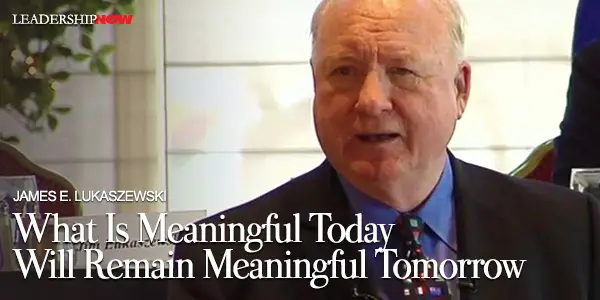
 CEO of The Lukaszewski Group Inc., James E. Lukaszewski (loo-ka-SHEV-skee) has been named as one of the top “28 experts to call when all hell breaks loose.” He is a coach to many CEOs and author of the excellent book, Why Should the Boss Listen to You? He also maintains the Crisis Guru Blog. In a presentation earlier this year, he offered this advice: When you get to be my age and look like me, you tend to get a lot of trend type questions. It’s a polite way of being asked to share the observations of a long and, presumably, useful career. In my case, the question, specifically, is often about trends in crisis situations, since that’s been the main focus of my career and work. “Was I seeing new or different kinds of crimes or problems committed by clients?” I usually respond with a question—have there been any new Commandments since the last 10 came out? The questioner, usually with a puzzled face, will say, “Well, no. The 10 we have are the 10 we’ve got.”  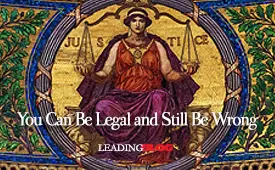
Posted by Michael McKinney at 07:46 AM
08.18.09

How Did I Get Into This Mess?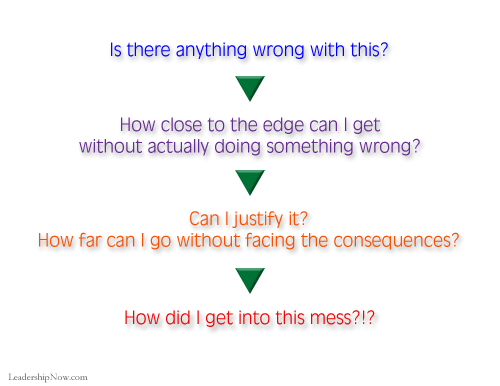
Posted by Michael McKinney at 11:44 AM
01.26.09

You Can’t Order Change: Making Ethics and Compliance a Clear Competitive Advantage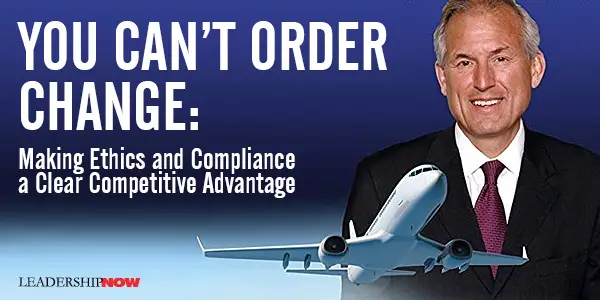
WHEN Jim McNerney became CEO of Boeing in 2005, change wasn’t an option. It was mandated. In 2005 Boeing was facing investigations into illegal business practices, there was the sex scandal, revenue was down, and key people were jumping ship. In short, it wasn’t the place to work. But even when everyone agrees that change is necessary – even vital – it doesn’t come easy. It still has to be approached in a careful and respectful way. You Can’t Order Change, by Peter Cohan, is about how McNerney brought about that change in Boeing. How he cleaned up the mess and changed the culture and revitalized the organization. Probably the biggest task that faced him was the quagmire created by years of costly ethical problems. He had to settle a lawsuit with the government and create a culture of ethics and compliance. This has to be done by example and system changes that encourage ethical behavior and compliance. He said in Boeing Frontiers, “I plan to make leadership development a focus across the company because I believe that as we strengthen our leadership capacities, we can have a positive impact on the company's overall performance. As I've said before, better leaders make better companies. And effective leadership, at all levels of an organization, is based on a foundation of trust, integrity, and escape-free compliance. As we turn up the gain in leadership-development training, we will embed in it an equal emphasis on how leaders can lead with ethics and integrity.” Cohan writes that McNerney made sure that ethics wasn’t a passing fad, but a value that had teeth in it. If the leaders of the organization “have not been behaving in a way that’s consistent with Boeing’s values, he expects them to change their behavior. And if they don’t meet McNerney’s expectations, they lose their leadership roles.” Step one for McNerney, of course, is getting the leaders to act ethically; to set the example. Cohan cites this statement from McNerney: We also realize it all starts with leadership. If an organization’s leaders don’t model, encourage, expect and reward the right behaviors, why should anyone else in that organization exhibit those behaviors? Companies have to take the hugely important step of driving ethics and compliance through their core leadership and Human Resources processes. This must be … and must be seen to be … a central part of the whole system of training and developing leaders and of the whole process of evaluating and promoting people. This is the key.” Critical also to this change is a system that supports and rewards people for getting results ethically and gets rid of people who don’t. Cohan writes, “McNerney let people know that he wanted them to discuss problems and not bury them.” If people didn’t talk about ethics and compliance, he would bring it up. “Ultimately, McNerney wants to avoid surprises about ethical problems that originate at lower levels. I know and you know … that one of the absolute perquisites for success in ethics and compliance is the belief that it is OK for people to question what happens around them.” McNerney’s methods and approach to change have gotten him dramatic results and they are worth studying. 
Posted by Michael McKinney at 01:35 PM
12.08.08

John Bogle on What is Enough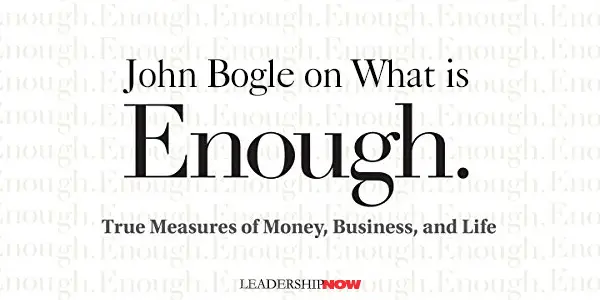
WE are about to begin a new year that is bursting with faith in hope. Whether that faith is justified remains to be seen. Yet you would be handicapping yourself if you did not read and reflect on John Bogle’s tour de force, Enough: True Measures of Money, Business and Life. The book is a result of a fair amount of reflection by Bogle himself. He offers a critique of American society today and asks what is or should be "enough" in money, in business, and in life. It is a book about character. He writes that “not knowing what enough is subverts our professional values” and leads us astray in life in general. “We too often bow down at the altar of the transitory and finally meaningless and fail to cherish what is beyond calculation, indeed eternal.” Not having grasped the concept of enough, we have seen the “subversion of our character and values.” We live in a time that values achievement over character. When the two collide, character often takes a back seat, and relationships of all kinds are shattered. Bogle observes that while the financial represents the worst of it, what we see today is not just a financial sector problem, but a societal problem. There is really just too much greed everywhere. He laments that we rely on numbers to give us facts that are really not facts: As I have earlier noted, the most important things in life and in business can’t be measured. The trite bromide “If you can measure it, you can manage it” has been a hindrance in the building a great real-world organization, just as it has been a hindrance in evaluating the real-world economy. It is character, not numbers, that make the world go ‘round. How can we possibly measure the qualities of human existence that give our lives and careers meaning? How about grace, kindness, and integrity? What value do we put on passion, devotion, and trust? How much do cheerfulness, the lilt of a human voice, and a touch of pride add to our lives? Tell me, please, if you can, how to value friendship, cooperation, dedication, and spirit. Categorically, the firm that ignores the intangible qualities that the human beings who are our colleagues bring to their careers will never build a great workforce or a great organization. Enough is really about discovering what is really important in our lives. While Bogel is optimistic, he says that he has “developed a profound concern that our society is moving in the wrong direction.” The only way to work our way through today's deep-seated problems is to return to values that “stem from principle, virtue and character.” It’s a call to redefine success in our own lives. We have more than enough of the fool’s gold of marketing and salesmanship and not enough of the real gold of trusteeship and stewardship….We focus too much on things and not enough on the intangibles that make things worthwhile; too much on success (a word I’ve never liked) and not enough on character, without which success is meaningless….Our society cannot and should not tolerate the substitution of moral relativism for a certain form of moral absolutism, and its debasement in the ethical standards of commerce. 
Posted by Michael McKinney at 09:57 PM
08.25.08

Reality Always WinsLeading With Kindness could just as well have been titled, Leading With Respect – respect for others and ultimately a healthy self-respect. Leadership, if properly practiced, is not made effective by harsh or oppressive treatment. Major General John Schofield put it this way in an address to the Corps of Cadets at West Point in 1879:He who feels the respect which is due others cannot fail to inspire in them regard for himself, while he who feels, and hence manifests, disrespect toward others, especially his inferiors, cannot fail to inspire hatred against himself.Honesty and integrity is about respect for others. Its expression is a manifestation of that respect. Dishonesty is disrespect. Dishonesty comes in all shapes and sizes, but the authors, Baker and O’Malley, reminds us, “dishonesty is a fundamental failure to recognize the existing facts, regardless of whether you deceive yourself or others….The truth always has a way of expressing itself in the end. But this end is often too late. Success in life as within the corporation requires a respect for reality from the start.” How an organization conducts is business is a clear sign to employees as to what is expected of them—or more to the point, what they can get away with. “Perhaps the most obvious reason people within organizations cheat and lie is because either it is in their short-term interest (usually financial) to do so, or they are covering up unethical behavior.” In order to offset the temptations in the system for personal gain or punishment avoidance, the authors offer these suggestions:
Posted by Michael McKinney at 06:41 AM
07.30.08

Do You Need a Good Rationalization?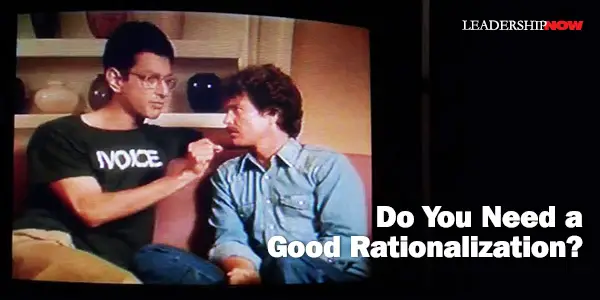
IT IS EASY for us to deceive ourselves. In The Big Chill, Jeff Goldblum’s character Michael Gold observed, “I don't know anyone who could get through the day without two or three juicy rationalizations.” How true. Rationalizations help us to justify thinking or behavior that we suspect is questionable in the first place. It blurs distinctions. Rationalizations are easy to see in others, but our own take a little more effort to label them for what they are. To aid us in this endeavor, Ronald Howard and Clinton Korver, authors of Ethics for the Real World, offer these tests to see if our thinking stands up to a little scrutiny. Other-Shoe Test. The age-old question: How would we feel if the shoe were on the other foot? Front-Page Test. Would we think the same was if it were to be reported on the front page of the Wall Street Journal? Or the New York Times? Or USA Today? Or the paper our hometown friends read? Biased-Language Test. Would we feel similarly if we replaced our value-laden language—euphemisms and cacophemisms—with value-neutral language? Role-Model Test. Would we do the same if our action exemplified the behavior we would expect from our children? Loved-One Test. Would we change our mind if the person on the receiving end of the ethical transgression were a loved one? Mother’s Test. And the simplest of all: what would our mother think? “If we show no interest in asking such questions, we are already on shaky ground.”
Posted by Michael McKinney at 04:26 PM
07.07.08

5 Leadership Lessons: Transparency
Posted by Michael McKinney at 10:18 PM
06.06.08

Ethics: We Are They
Many people we encounter downplay the ramifications of inconsistent ethical conduct, especially when it comes to smaller compromises. On the path to becoming skilled ethical decision makers, however, we will find it helpful to take both big and small indiscretions seriously. Errors in thought are usually the same in both cases. For example, we may refer to lying as exaggeration, taking creative license, spinning. We may excuse ourselves as being lawyerly, forgetful, or tactful. But when we use euphemisms for such actions, we redefine them as less than wrong. This inculcates a risky thinking pattern, where we cloud our ability to reason—and sometimes erroneously assume the reasoning makes sense to those we deal with. In a Zogby International poll of eight thousand adults, 97 percent said they consider themselves trustworthy. On the other hand, only 75 percent consider the people they work with and live near trustworthy. Allow us to speculate that the gap between these two figures may reflect more than perception. Behaviors that may seem ethical to us may not be considered so high-minded by people we deal with. Transgressions crop up in the lives of people across all levels of society. The individuals perpetrating them have all levels of education and work in all professions, trades, and industries. It is counterproductive to think we are not players on a landscape dotted with pitfalls we may stumble into ourselves. Temptation is everywhere—and so is compromise. One danger is that we will get caught up in a sequence of not just small temptations but big ones. Maybe they will be life changing or life threatening. Faulty thinking can lure us into wrongs we never imagined. Philip Zimbardo, a psychology professor at Stanford University, has for decades studied the genesis of evil. He writes, “Virtually anyone could be recruited to engage in evil deeds that deprive other human beings of their dignity, humanity and life . . . we live with the illusion of moral superiority . . . We take false pride in believing that ‘I am not that kind of person.’” The fact is, we are all that kind of person. We are they. Through thinking errors, denial, and rationalization, we can all be put in a position of selling our character for a pittance, of sacrificing our relationships for a song. That’s yet another reason why it is helpful to take a conscious, systematic approach to breaking risky ethical thinking habits—on even the small things. Adapted from Ethics for the Real World: Creating a Personal Code to Guide Decisions in Work and Life by Ronald A. Howard and Clinton D. Korver
Posted by Michael McKinney at 01:31 AM
08.17.07

How To Increase the Incidence of Good Work In Our Society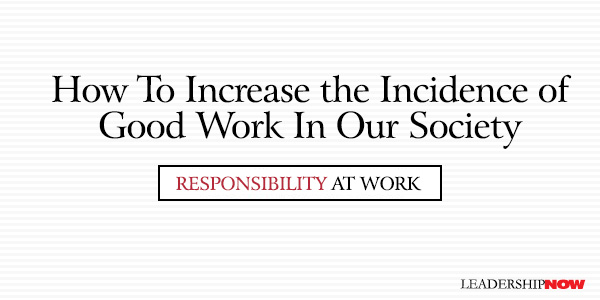
Ever since Adam and Eve were expelled from the Garden of Eden, human beings have had to work “by the sweat of our brows.” For most of human prehistory and much of recorded history, work has not been an activity on which we have had much perspective. Howard Gardner continues, “If we are to have a society that is open and fair, individuals must willingly, even energetically, be prepared to carry out crucial actions—ones required for the achievement and maintenance of such a society.” This sets the stage for his book, Responsibility at Work. The book of basically a collection of reports on the GoodWork® Project. Began in 1994 by Mihaly Csikszentmihalyi, William Damon, and Howard Gardner, the GoodWork® Project seeks to determine how best to increase the incidence of good work in our society. From the reports given, Gardner lists seven widely applicable takeaways:
Gardner gives an important caution, one that needs wider attention. “Recognizing the complexity of ethics is not the same, however, as embracing relativism. That the answer is not always clear-cut or that judgments may be controversial is scarcely a license for ‘anything goes’.” Extremely well put. At the expense of making this post a little long, let me give you a couple of other thoughts from the book: William Damon and Kendall Cotton Bronk contributed: “A critical component of [Max] De Pree’s philosophy on leadership was accountability. Leaders, he believed, should have enough faith in their workers to allow those workers to be personally accountable for the work they do. “De Pree had a series of mentors who helped him see his work in a broader context. In our interview, he talked about the important role that ethical businesses play in the support of the societies they serve. ‘I think that my business career was kind of pilgrimage away from, you know, how you can build up the revenues . . . towards a goal of figuring out what are the preserving principles of the free market system in a democracy.’ Mentors helped De Pree connect his work life to his religious life. They helped him see how his work life could serve society and, in doing so, serve his religious aims as well.” And finally, again from Gardner: “Professions need to respect their current instantiation but not be paralyzed by it. Change for change‘s sake is rarely indicated, but reflexive adherence to the status quo is equally problematic. Those professionals and professions that keep their principle values and goals centrally in mind are the ones most likely to thrive; they can peer through accidental changes in methods of delivery while making certain that the most important needs and desires are being appropriately fulfilled.” 
Posted by Michael McKinney at 09:48 AM
05.29.07

The New Golden RuleDo we need a new Golden Rule? It’s not uncommon to find in modern literature, the call for a new golden rule. Is the Golden Rule adequate in today’s world?The Golden Rule says, “Do unto others as you would have them do unto you.” Some would say that this just isn’t enough: in our global village, we need to consider cultural differences and the desires of others. This thinking suggests that we humans have never found ourselves in a multicultural setting before now. The new Golden Rule goes something like this: Do unto others as they would have you do unto them. The need for a change really reflects a narrow view or understanding of the original intent of the Golden Rule.  In fairness, calls for a new rule points to the very real need to explain the intent of the original. That it should and would need to be explained properly to each succeeding generation is a fact of life. In fairness, calls for a new rule points to the very real need to explain the intent of the original. That it should and would need to be explained properly to each succeeding generation is a fact of life. It should be noted that the term “Golden Rule” does not come from the Bible. However, the Bible does say that whatever you want men to do to you, do also to them. The rule has been stated in many ways for millennia. Almost 4000 years ago, written on papyrus, we have from the Egyptian story, The Tale of the Eloquent Peasant, "Do for one who may do for you, that you may cause him thus to do." Similarly, the Roman statesman and philosopher Seneca instructed leaders to "Treat your inferiors as you would be treated by your superiors." (Epistulae morales ad Lucilium 47:11) Clearly, human nature hasn’t changed much. Rules are tools designed to get our thinking and behavior to a place that we might not naturally go to on our own. As a rule, the Golden Rule is no different. It is an attempt to guide us to the thinking behind the rule so that it is manifested in our behavior. The Golden Rule is an introduction to a lesson on responsibility, awareness, ethics and outgoing concern for others. The principle the rule is trying to get at is one of selfless service to others. We naturally look at things from our own vantage point. So it’s not surprising that we look at the rule selfishly as well—from our own viewpoint. The rule has within it the implicit instruction to treat others thoughtfully—in the same manner of outgoing concern—as you would like them to treat you. Certainly none of us would want others to treat us in a way that shows disregard for our personal needs and feelings. The principle of the Golden Rule is selflessness. It is not meant to imply that you should do for others exactly what you want them to do for you. It’s not about you. This rule is about how to treat others. It’s not a manipulative behavior to get others to do something for you. It’s an approach to how you should be treating others regardless of how they treat you. It’s not a training behavior to get others to do a specific act for you. “I did this for you, so now you should do this for me.” We are to treat others—in the same manner—as we would like to be treated by anyone we come into contact with. The Golden Rule is a lesson that can hardly be introduced to children soon enough. It’s a prescript that should be followed throughout life. This is a tall order, but something every leader should strive to develop. It is the essence of service and servant leadership. Properly understood, the Golden Rule encompasses cultural and personal differences. Certainly, the intent of modern literature on this issue is to jog our thinking from a self orientation to an other orientation in our dealings with others. As is, the Golden Rule, if practiced, would go a long way to improving our relationships.
Posted by Michael McKinney at 09:05 AM
03.08.07

Leader's Capacity to Sustain Change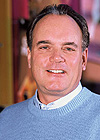 An important component of changes in management practice is building the capacity to sustain that change. This can be done within the company through, for example, the kinds of internal universities found at GE or BD. It can be done by influencing the curricula of business schools so that, for example, what they teach is more innovative in their approach to ethics. Marineau:
Posted by Michael McKinney at 01:17 AM
03.06.07

CSR: A Return on Integrity The report provides the perspectives of 48 CEOs and senior executives representing 27 major multinational companies from a cross-section of industries who participated in lengthy interviews with Boston College researchers. The executives provide candid assessments about how expectations of their role are changing and the dilemmas that presents. Here are some highlights: Perspectives vary greatly. GE Chairman and CEO Jeffrey Immelt said, "Profits are created by businesses that are doing things that ultimately have real societal benefits. And businesses have not done a good a job of describing that.” While Néstle Chairman and CEO Peter Brabeck-Letmathe warned companies to “be careful what language you’re using. Because when you say you should give something back, you are intrinsically saying that you have been exploiting society. I have nothing to give back to society; I have given to society before.” Todd Thomson, Citigroup’s Chairman & CEO Global Wealth Management Division, I believe clearly laid out the issue, “Business managers should not be confused about what their objective is, what their purpose is. Their purpose is to create value for shareholders. The way to do that, however, I think is to understand all your stakeholders.” While the majority of executives did not want to turn their companies into social organizations, they did feel they have to take business’s role in society seriously. Asked to choose between five different opinions about the role of business in society, only six percent agreed with the proposition that the private search for profit advances the public good: that an executive’s duty is just to create wealth for investors. By contrast, over 50 percent believed that companies had a much more inclusive social purpose, while 15 percent felt companies should demonstrate the moral principles of capitalism. Challenging other top executives, KPMG Chairman Mike Rake said, “We need chairmen and chief executives to be courageous and determined to take a longer-term view on their business. They need to be leaders of the business in a sense that really engages their people, their stakeholders, their shareholders, their communities, in believing that what they’re doing is good for their business, good for their communities and that these are inextricably intertwined.” Tom McCoy of AMD points out that, “as business leaders, sometimes we forget the simple things about life, about what's human and what isn't. And until we really get that right, we are condemned to continue in these periodic cycles of greed and untethering from social responsibility.” The obligation would seem to be on management to create a more values-based company aligned with the values of the society in general. One executive commented, “The word that most people outside the U.S. use to describe an American business person is ruthless, and many of us take pride in the fact that we are a ruthless competitor. But the last time I looked it up in the Webster’s dictionary, ruthless wasn’t exactly a great word to be associated with. I think that the time has come for these things to move.” Companies face what GE’s Heineman called “the fundamental tension at the core of capitalism: the question of how you have the right sort of performance with integrity.” While there are all manner of small steps that could be taken to strengthen the business-society relationship, four important areas stand out as ones where progress offers enormous potential returns: • Challenging the short-term perspective of the capital markets • The respective roles of business and government in public policy • Creating a soft landing to globalization • Courageous leadership 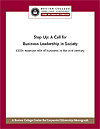 None of these is an easy option, and they certainly do not represent a package of ideas that all executives would support. But moving the needle on any one will yield significant dividends. Ralph Shrader, Chairman & CEO Booz Allen Hamilton, concludes, “The corporation’s primary responsibility is to ensure its existence within an ethical and responsible framework. The idea of profit at any cost is something that is past its time.”
Posted by Michael McKinney at 08:51 AM
01.05.07

Caught in a Dilemma: Hard Choices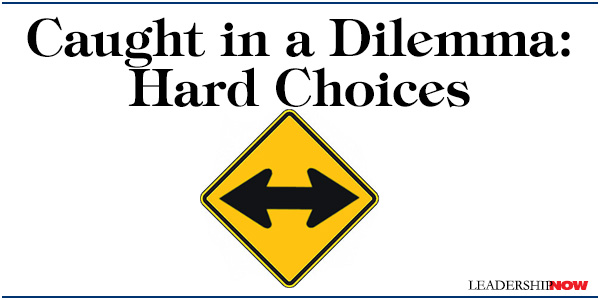 The Book of Hard Choices is a book about integrity. We are reminded that integrity is one of those words that doesn’t mean a thing until it becomes behavior. And it’s all the more important in difficult and challenging circumstances. Eventually, your integrity will be put to the test.
The Book of Hard Choices is a book about integrity. We are reminded that integrity is one of those words that doesn’t mean a thing until it becomes behavior. And it’s all the more important in difficult and challenging circumstances. Eventually, your integrity will be put to the test.
The authors James Autry and Peter Roy have found that the really tough choices are not about money but relationships. And the little everyday stuff is just as important as the big dilemmas. They write, “Once you recognize that your integrity is on the line every day, then your work life takes on a different meaning.” As organizations have pressured their workers to work harder and work longer, they have helped create an atmosphere in which the concepts of civility and cooperation are lost in the hurry-scurry of a high-pressure workplace. Using a series of 23 stories the authors offer up hard choices that we any one of us could face. For example, do you go for the quick fix or teach values first? When the pressure is on to turn things around, the temptation is to skip over a lot of the “pleasantries.” In their example, the CEO said that first, you need to lay out the ground rules and be consistent. “It always starts with respect, and that means respect even under pressure. It takes more time to treat people with respect, and when you are under pressure, it seems counterintuitive to insist on something that takes more time. But without the value of respect, nothing else works. He continues, “Of course you can always try the quick fix, but most of these companies didn’t get into a mess overnight. You can apply the Band-Aid if you’re just planning to flip the business, but I’m not looking to do that. I’m looking to provide a foundation for growth. So if you’re planning to really turn the business around you’ve got to start with basics. No turnaround will be lasting unless you start with the basics. And I think there has got to be leadership by example.” This is great advice. And of course, it applies in all kinds of relationships. It is a foundation of all relationships—both work and personal— of counseling and of creating a learning environment. Most problems we face weren’t created overnight and require to time to bring about a long-term fix. We can’t afford to overlook this first crucial step. 
Posted by Michael McKinney at 08:35 AM
12.08.06

No Smoke‚ No Mirrors ... Straight Down the Middle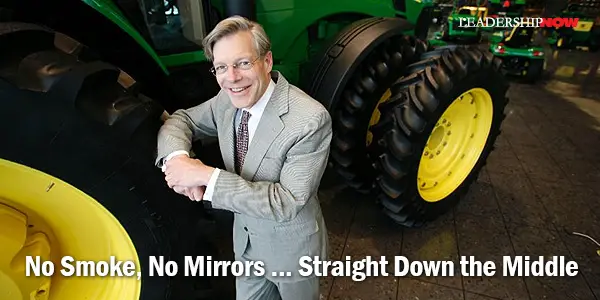
ROBERT W. LANE, the former “chief steward” (as he referred to himself) of the 169-year-old John Deere Company, shared a few thoughts on integrity to the students at the Mendoza School of Business of the University of Notre Dame. First, it is probably best to define what I mean when I say “integrity.” It means: “No smoke‚ no mirrors, no tricks … straight down the middle.” It means no exaggerations, no dissembling; just the “real deal.”
Posted by Michael McKinney at 09:30 AM
10.12.06

Warren Buffett on Ethics On backdating, Buffett wrote, “My guess is that a great many of the people involved would not have behaved in the manner they did except for the fact that they felt others were doing so as well.”This once again underscores the point that there is most often a difference between what is legal and what is right or ethical. Legally we may be allowed to behave in ways that are not ethical. We are allowed to conduct ourselves in ways that we would not like to see others doing to us. Legal is about what we can get away with. Ethical is about what is right. The spirit of the law sometimes looks very different than the letter of the law.
Posted by Michael McKinney at 12:02 AM
09.28.06

Ethics: Reinforcing Fixed Points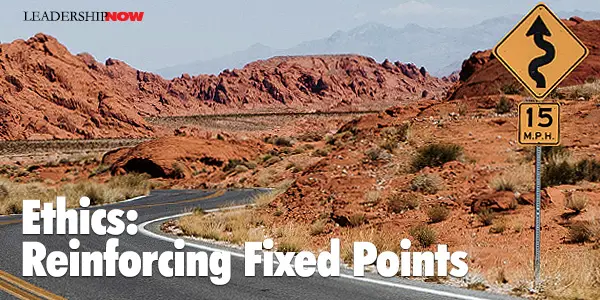
HERE IS A GOOD comment on the dynamics of ethics in a changing world from The Ethical Challenge (2003) in a chapter entitled Ethics, Virtuousness, and Constant Change by Kim Cameron, professor at the University of Michigan Business School:
 
Posted by Michael McKinney at 12:05 AM

B-Schoolers Are More Likely to Cheat Than Other Students
Posted by Michael McKinney at 12:01 AM
09.25.06

Doublespeak: Do Companies Really Give a Damn? (CSR)
Posted by Michael McKinney at 12:31 AM
06.08.06

The Skilling TrapMark Gimein wrote a great analysis of the Enron scandal in Business Week. In The Skilling Trap, he hits the nail on the head. But there's more to it. "That's the way the system works." It's a strange thing for a man to say who has been convicted of 19 separate criminal charges. Reduced to words on a page, you can imagine the tone to be bitter or accusing. But it's not. Nor is it gallows humor, a tip of the hat to the prosecutors who won their case, but something more poignant.It’s easy to blame the system, but the system isn’t something outside ourselves, some vast unseen force putting pressure on us to do things we don’t want to do. We are the system. It works that way because we work that way. It won’t change until we do. Adding more laws can’t protect us from ourselves. What is lacking here is character and the integrity to maintain right principles even at a personal loss. Gimein continues and address the spirit of the law: But what made Enron possible was not a lack of rules. It was an unwillingness to think about regulation and responsibility in any but the most legalistic terms.The Skilling Trap is that trap you fall into when you don’t see beyond the letter of the law. Sadly most laws are in place because we substitute what’s legal for what’s ethical. They are not the same. It’s a tug of war we have all experienced. Ethical addresses what should I do. Legal is about what do I have to do. If legal is the only consideration then caution is the watchword. Ethics is about principles and responsibilities. As Mark Gimein observes, the issue is failure to deal with the spirit of the law. If your actions are right but your attitude is wrong, it will eventually catch up with you. When leaders are looking out for themselves—when leaders are in it for what they can get not for what they can give—we have Enrons. Leadership is about service and looking out for those you are responsible for. Some readers will yawn at this, but character is a real issue with real consequences.
Posted by Michael McKinney at 10:06 AM
04.24.06

What Would You Do?
With Leslie Robertson, the engineer of the World Trade Center, the team devised a plan to methodically reinforce all the bracing joints a floor at a time. The repairs would take the better part of three months, with work happening around the clock. Beirut's closing remarks have application to anyone both personally and professionally: We designers call ourselves problem solvers, but we tend to be picky about what problems we choose to solve. The hardest ones are the ones of our own making. They're seldom a matter of life or death, and for maybe for that reason, they're easier to evade, ignore, or leave to someone else. I face them all the time, and it's a testimony to one engineer's heroism that when I do, I often ask myself one question. It's one I recommend to everyone: what would William LeMessurier do?[The Citicorp Center in New York City is most famous for its 45 degree roof and its ten-story stilts. Standing at 914 ft (279 m) and 59 stories high, it was designed by Hugh Stubbins and built in 1977. Its unusual base was designed to incorporate the nearby St. Peter's Church.]
Posted by Michael McKinney at 09:02 AM
|
BUILD YOUR KNOWLEDGE
 

How to Do Your Start-Up Right STRAIGHT TALK FOR START-UPS 
Grow Your Leadership Skills NEW AND UPCOMING LEADERSHIP BOOKS 
Leadership Minute BITE-SIZE CONCEPTS YOU CAN CHEW ON 
Classic Leadership Books BOOKS TO READ BEFORE YOU LEAD |
| ||||||||||||||||||||